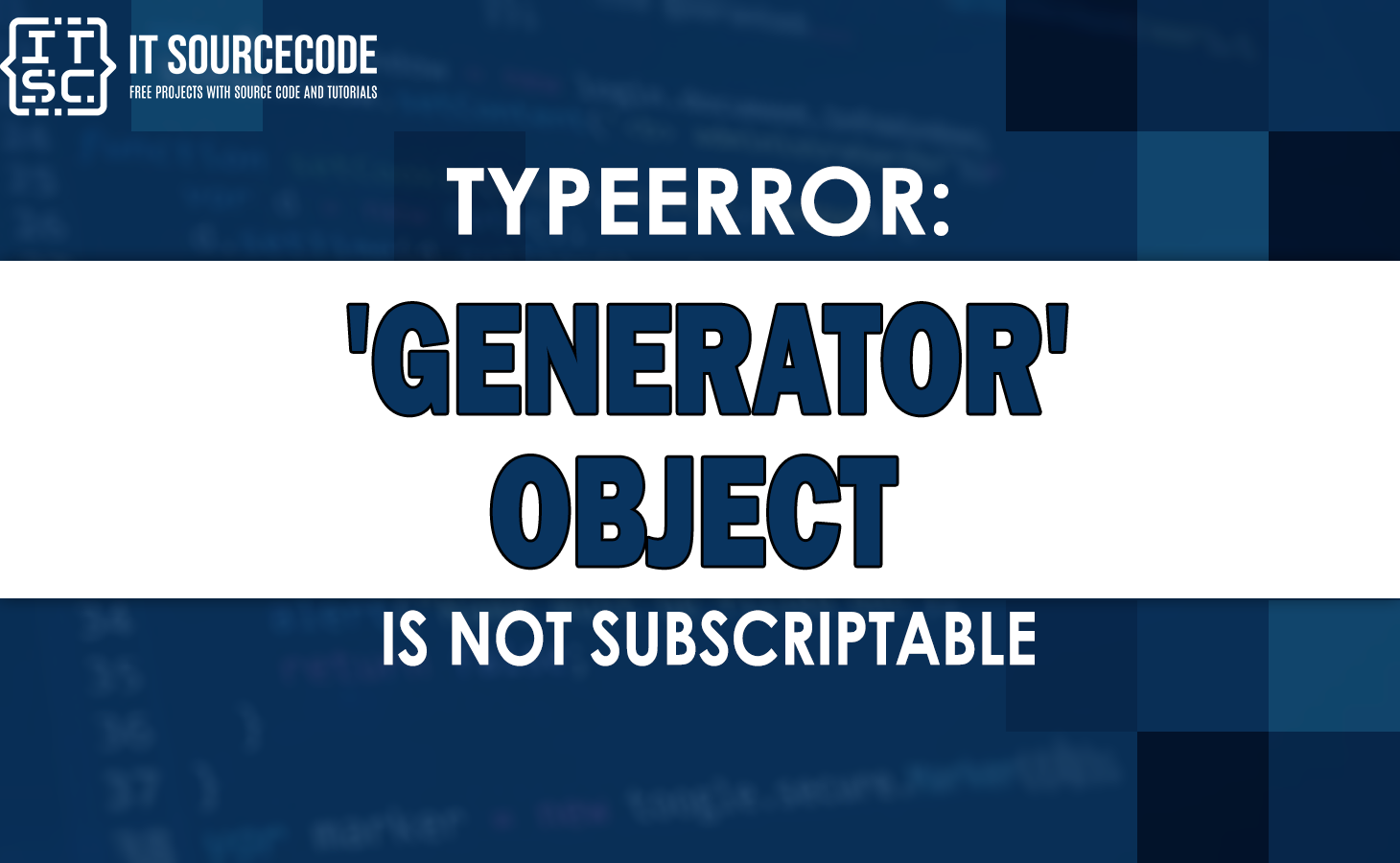If you’re a Python programmer, you might have encountered the “typeerror generator object is not subscriptable” error message.
This error message can be confusing and frustrating, specifically if you are not sure why it is occurring.
In this article, we will explain to you what a generator object is and why it is not subscriptable.
We will also provide examples of this error and how to resolve it.
Why does the “TypeError: generator object is not subscriptable” error occur?
The “TypeError: generator object is not subscriptable” error typically occurs because when you attempt to use square brackets to access individual elements of a generator object.
Generator objects are not subscriptable, it means that you cannot use square brackets to access them.
Subscripting in Python
In Python, subscripting is an action to access individual elements of a sequence, such as a list or a tuple.
To subscript a sequence, you can use square brackets after the sequence name.
In the Inside of the square brackets, you can put the index of the element you want to access.
For example, if you have a list named my_list, and you want to access the first element of the list.
For example, you will use the following code:
my_list = [1, 2, 3, 4, 5]
print(my_list[0])Output:
C:\Users\Dell\PycharmProjects\pythonProject\venv\Scripts\python.exe C:\Users\Dell\PycharmProjects\pythonProject\main.py
1
Common Causes of typeerror: generator object is not subscriptable
Here are the two common causes of the error:
Causes 1: Attempting to Index a Generator Object
One of the common cause of the “TypeError: generator object is not subscriptable” error is attempting to access individual elements of a generator object using square brackets.
Since generator objects are not subscriptable, this will raise a TypeError.
For example, we will consider the following code:
def country_generator():
yield 1
yield 2
yield 3
gen = country_generator()
print(gen[0])In this example code, we define a generator function that yields the numbers 1, 2, and 3.
Then, we create a generator object from this function and attempt to access the first element of the generator using square brackets.
The output will be typeerror:
C:\Users\Dell\PycharmProjects\pythonProject\venv\Scripts\python.exe C:\Users\Dell\PycharmProjects\pythonProject\main.py
Traceback (most recent call last):
File “C:\Users\Dell\PycharmProjects\pythonProject\main.py”, line 7, in
print(gen[1])
TypeError: ‘generator’ object is not subscriptable
Causes 2: Attempting to Slice a Generator Object
Another common cause of the “TypeError: generator object is not subscriptable” error is attempting to slice a generator object using the colon operator.
Since generator objects are not subscriptable, this will also raise a TypeError.
For example:
def my_generator():
yield 1
yield 2
yield 3
gen = my_generator()
print(gen[0:2])In this example code, we define a generator function that yields the numbers 1, 2, and 3.
Then, we create a generator object from this function and attempt to slice the generator using the colon operator.
The output will raises a TypeError since generator objects do not support slicing.
C:\Users\Dell\PycharmProjects\pythonProject\venv\Scripts\python.exe C:\Users\Dell\PycharmProjects\pythonProject\main.py
Traceback (most recent call last):
File “C:\Users\Dell\PycharmProjects\pythonProject\main.py”, line 7, in
print(gen[0:2]) # Output: TypeError: ‘generator’ object is not subscriptable
TypeError: ‘generator’ object is not subscriptable
How to solve the typeerror generator object is not subscriptable error?
Here are the two solutions to solve the typeerror generator object is not subscriptable error.
Solution 3: Convert Generator Object to List or Tuple
The first solution to solve the generator’ object is not subscriptable error is to convert the generator object to a list or a tuple.
Since lists and tuples are subscriptable, you can use square brackets to access individual elements of the sequence.
For example:
def my_generator():
yield 1
yield 2
yield 3
gen = my_generator()
my_list = list(gen)
print(my_list[0])In this example code, we define a generator function that yields the numbers 1, 2, and 3.
Then, we create a generator object from this function and convert it to a list using the list() function.
Finally, we access the first element of the list using square brackets.
The output will successfully execute:
C:\Users\Dell\PycharmProjects\pythonProject\venv\Scripts\python.exe C:\Users\Dell\PycharmProjects\pythonProject\main.py
1
Solution 2: Use Next Function Instead of Subscripting
The last solution to solve the “TypeError: generator object is not subscriptable” error is to use the next() function to iterate over the generator object instead of subscripting it.
The next() function returns the next value in the generator sequence each time it is called.
For example:
def my_generator():
yield 1
yield 2
yield 3
gen = my_generator()
print(next(gen))
print(next(gen))
print(next(gen))In this example code, we define a generator function that yields the numbers 1, 2, and 3.
Then, we create a generator object from this function and use the next() function to iterate over the generator and print each value.
Output:
C:\Users\Dell\PycharmProjects\pythonProject\venv\Scripts\python.exe C:\Users\Dell\PycharmProjects\pythonProject\main.py
1
2
3
Additional Resources
The following are the articles we’ve explained on how to solve the typeerror in python:
- Typeerror not supported between instances of str and int
- Typeerror: ‘float’ object is not subscriptable [SOLVED]
- Typeerror: int object does not support item assignment [SOLVED]
- typeerror: ‘_environ’ object is not callable
Conclusion
In this article, we explained what the “TypeError: ‘generator’ object is not subscriptable” error means.
How it can occur, and how you can fix it. We showed that generator objects are not subscriptable.
It means that you cannot use square brackets to access individual elements of the sequence.
Instead, you can convert the generator object to a list or a tuple, or you can use the next() function to iterate over the generator object.
FAQs
A generator object in Python is a type of iterator that generates a sequence of values on-the-fly, rather than storing them all in memory at once.
In Python, subscripting is the act of accessing an item in a sequence by its index. However, because a generator object doesn’t store all its values in memory, it doesn’t have an index that can be accessed in this way.
No, you cannot use slicing with a generator object in Python. Generator objects are not subscriptable, it means that they do not support slicing.

